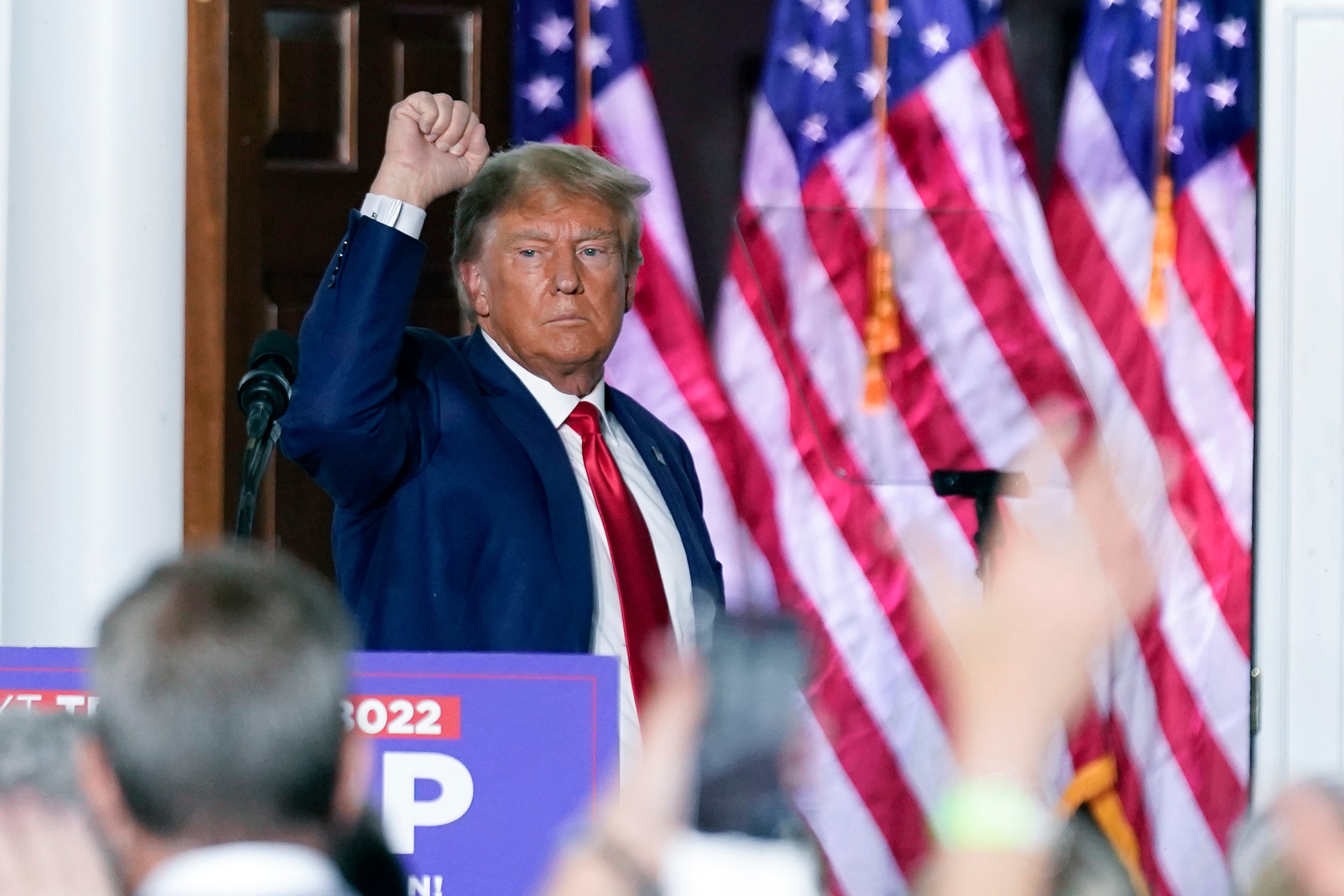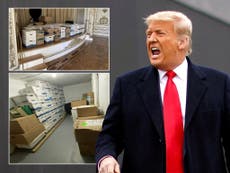Trump says ‘Clinton socks case’ gets him off the hook – what was it and is he right?
The case referenced by Mr Trump has nothing to do with the ex-president’s late cat — or the charges against him
Your support helps us to tell the story
From reproductive rights to climate change to Big Tech, The Independent is on the ground when the story is developing. Whether it's investigating the financials of Elon Musk's pro-Trump PAC or producing our latest documentary, 'The A Word', which shines a light on the American women fighting for reproductive rights, we know how important it is to parse out the facts from the messaging.
At such a critical moment in US history, we need reporters on the ground. Your donation allows us to keep sending journalists to speak to both sides of the story.
The Independent is trusted by Americans across the entire political spectrum. And unlike many other quality news outlets, we choose not to lock Americans out of our reporting and analysis with paywalls. We believe quality journalism should be available to everyone, paid for by those who can afford it.
Your support makes all the difference.For Americans who lived through the 1990s, the words “Clinton” and “Socks” may bring to mind a whimsical image of a certain famous feline, of the black-and-white tuxedo variety, who prowled the most prestigious halls of American power at a time when the US was emerging as the world’s sole unchallenged superpower.
But for former president Donald Trump, those two words represent the latest attempt to manifest a legal defence for his alleged unlawful retention of hundreds of documents with classification markings at levels up to “top secret,” long after his term.
The Florida federal judge overseeing the Espionage Act and obstruction of justice case against Mr Trump has rejected the disgraced ex-president’s bid to delay his trial until after the 2024 election.
US District Judge Aileen Cannon issued an order on 21 July granting the government’s request to set a speedy trial date and schedule for pretrial motions, with a start date of 20 May 2024.
Prosecutors with the office of Justice Department Special Counsel Jack Smith had asked for her to set a December 2023 trial date, four months after the August date she’d put on the court’s calendar shortly after Mr Trump and his co-defendant Walt Nauta first appeared in a Miami courtroom to answer the 38-count indictment charging the ex-president with unlawfully retaining national defence information, and charging both him and Mr Nauta with conspiracy and obstruction of justice offences.
At a campaign fundraiser and birthday party-cum-rally following his arraignment on 37 separate federal criminal charges, Mr Trump laid out what looks to be the argument his attorneys will present when the unprecedented case against him is heard by US District Judge Aileen Cannon at some point in the future.
“Under the Presidential Records Act, which is civil, not criminal, I had every right to have these documents. The crucial legal precedent is laid out in the most important case ever on this subject known as the Clinton socks case,” he said.
Mr Trump was referencing a decade-old civil lawsuit brought by Judicial Watch, a right-wing activist group, which had sought access to audio recordings of a series of conversations between former president Bill Clinton and Taylor Branch, an author and historian with whom Mr Clinton regularly met during his eight years in the White House.
The existence of the recordings, which were created by Mr Branch, only became known when Mr Branch published his 2009 book, The Clinton Tapes: Wrestling History With The President.
The tapes had supposedly been kept in Clinton’s socks drawer – hence the name.
Judicial Watch had asked the US District Court for the District of Columbia for a declaratory judgment stating that the tapes, which were recorded during Mr Clinton’s presidency, were official records of his administration under the Presidential Records Act. They also asked for the court to order the National Archives and Records Administration to take possession of the recordings and deposit them in Mr Clinton’s presidential library.
That law, which was enacted under then-president Jimmy Carter in 1978, stated that “documentary materials, or any reasonably segregable portion thereof, created or received by the President, his immediate staff, or a unit or individual of the Executive Office of the President whose function is to advise and assist the President, in the course of conducting activities which relate to or have an effect upon the carrying out of the constitutional, statutory, or other official or ceremonial duties of the President” were the property of the US government and had to be deposited with Nara at the end of a president’s time in office.
Congress had passed the PRA to stop former president Richard Nixon from destroying records from his defunct administration, which would have been within Mr Nixon’s purview at the time since prior to that law’s enactment, presidential records were considered property of the president in whose administration the records had been created.
Though Judicial Watch argued that the tapes fell under the category of “documentary materials” created during Mr Clinton’s term, Nara had already determined that the tapes were “personal records” for PRA purposes, meaning they were “of a purely private or nonpublic character” because they were “the functional equivalent of a diary or journal which are not prepared or utilized for, or circulated or communicated in the course of, transacting Government business”.
And in her 2012 memorandum opinion referenced by Mr Trump, District Judge Amy Berman Jackson granted Nara’s motion to dismiss the lawsuit for failing to state a claim upon which relief could be granted.
Citing a pair of 1991 appellate court rulings which found that the PRA did not give courts the power to review Nara’s decisions regarding categorisations of records as presidential or personal, Judge Berman Jackson found that Judicial Watch had not cited any provision of the Administrative Procedure Act which would support a decision to order Nara to reclassify the Clinton-Branch tapes as presidential records and take custody of them.
“If certain records are not designated as Presidential records, the Archivist has no statutory obligation to take any action at all, and there is nothing to compel under the APA,” she wrote.
“In order to accept plaintiff’s theory that … the PRA creates a mandatory duty for the Archivist to assume custody and control of what he or she considers to be Presidential records regardless of how the President designated the documents, the Court would be required to ignore the rest of the PRA’s statutory scheme. This it cannot do”.
Even a layman’s reading of that 2012 decision would, in theory, give a reader the impression that the case says the opposite of what Mr Trump claims. Yet in the 10 months since the FBI carried out a court-authorised search of his Palm Beach, Florida property, the twice-impeached, now twice-indicted ex-president and his allies have repeatedly argued the judge’s ruling gives former presidents plenary power to classify any given record as a personal record, and the government therefore had no right to seek the return of the national defence information he has been charged with unlawfully retaining.
The ex-president stated as such during his June speech, telling attendees: “The decision to segregate personal materials from presidential records is made by the president during the president’s term, and in the president’s sole discretion.”

“In other words, whatever documents the president decides to take with him, he has the right to do so. It’s an absolute right. This is the law, and that is something that people have now seen, and it couldn’t be more clear,” he added.
But according to legal and government records experts, the sweeping authority Mr Trump described is most certainly not, in any way, shape or form, “the law”.
Mark Zaid, a Washington, DC attorney who specialises in national security matters, told The Independent in a text message that Mr Trump’s repeated invocation of the Judicial Watch case is nothing more than argle-bargle meant to give partisans something to say in his defence, and not in any way a passable legal argument.
“That civil decision is completely irrelevant and will have no substantive impact on the criminal proceedings. The reference is nothing more than PR talking point meant to energize their political base,” he said.
Ed Whelan, a conservative legal scholar who once served as a clerk for the late Supreme Court Justice Antonin Scalia, wrote on Twitter that the arguments being put forth by Mr Trump and his allies amount to “a bizarro account of the PRA”.
Mr Whelan, who was commenting on a Wall Street Journal op-ed authored by a Judicial Watch attorney called Michael Bekesha, argued Mr Bekesha was misrepresenting the outcome of the lawsuit which his organisation had brought more than 10 years before.
“It’s [one] thing for court to rule it doesn’t have authority to order Nara, against its judgment, to take control of docs taken by [a] former president. It would be quite another to maintain that [the] PRA prevents current president from recovering classified docs from [a] former president,” he said.
He continued: “Under Bekesha’s misreading of Presidential Records Act, [a] current president has no means (other than begging) of getting [a] former president to return wrongly retained national-security docs, no matter how sensitive. Very odd to torture [the] PRA and 2012 ruling to reach such a result”.
Not only was Mr Trump’s apparent defence panned by members of the legal community, but it also drew ridicule from another expert contacted by The Independent, a civil servant who has worked with administrations of both parties and specialises in the management and flow of government records.
This person, who asked to remain anonymous because they are generally not authorised to speak with the press, called Mr Trump’s claim to have designated as “personal” documents containing sensitive national defence information, “complete and utter bulls*** without compare”.
The expert explained that the documents in question were not properly categorised as either personal or presidential records because they were created within the Defense Department or US Intelligence Community, not within the Executive Office of the President.
“It’s the absolute most ridiculous thing I’ve ever heard,” they said when asked about Mr Trump’s argument. “It’s the kind of thing you’d say if you secretly want to go to prison”.





Join our commenting forum
Join thought-provoking conversations, follow other Independent readers and see their replies
Comments